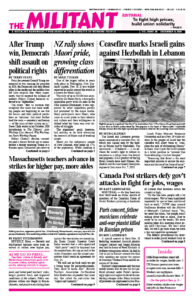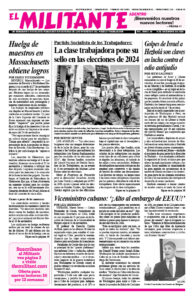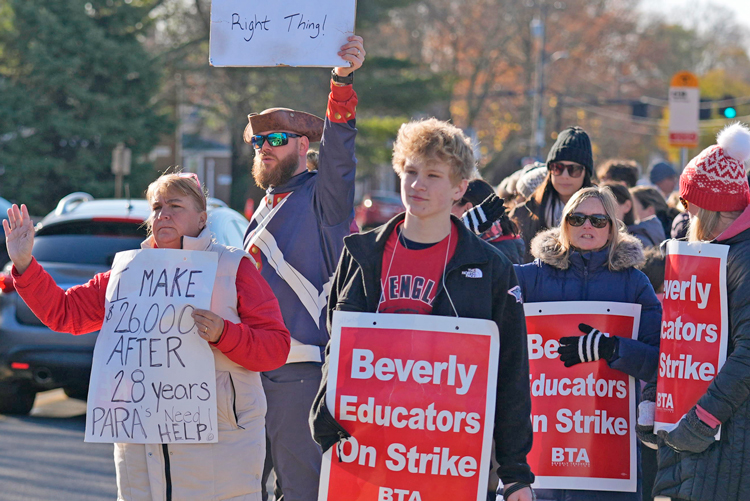BEVERLY, Mass. — Beverly and Marblehead teachers have been involved in strikes over higher pay, more and better-paid teachers’ aides, longer parental leave, and improved conditions in the schools. Public employees strikes are illegal in Massachusetts, and punitive escalating fines against the two unions are mounting. An Essex County Superior Court Judge warned that a state-appointed “third party” could be imposed into the negotiations, forcing an end to the strike if teachers and the school committees didn’t reach an agreement by Nov. 24.
AS WE GO TO PRESS…
Teachers’ unions in Beverly and
Marblehead announced gains won
in recent strikes, tentative agreements,
allowing schools to reopen.
“We will not go back until we get a living wage for paraprofessionals. They need to know that,” Beverly Teachers Association Co-President Julia Brotherton responded that same day. She called the anti-strike law “unjust and immoral.”
Members of the nearby Marblehead Education Association are also continuing their strike.
Teachers in Gloucester also walked out Nov. 8. They signed a tentative agreement Nov. 22 and returned to work three days later. They won higher salaries for teachers and extended paid parental leave. The Union of Gloucester Educators, however, conceded that while they won higher wages for paraprofessionals, they still aren’t high enough. They will make around $36,000 by the end of the five-year contract.
Strike solid despite government threats
State and local officials have ratcheted up threats against the teachers. “Tougher action is needed on teachers strikes, much higher fines would make a difference,” insisted the editorial in the Boston Globe Nov. 19. It urged the state to get tougher on teachers and their unions.
Fines have been levied against the striking unions totaling in the hundreds of thousands of dollars: $50,000 a day since the third day of each strike, increased by $10,000 each day the strike continues.
Gov. Maura Healy scolded teachers Nov. 23, threatening that “students need to be back in school” even if new contracts are not in place. It’s “unacceptable” that students have been out so long, she said.
At a rally Nov. 24 in front of Beverly Middle School the mood of strikers was high and community support was visible. Pro-teacher signs dotted front yards as this Militant worker-correspondent drove into town. Strikers were joined by teachers from Gloucester and Newton with their union hats and placards, as the crowd chanted, “When we fight, we win!”
Dawn Leoni, a Gloucester seventh-grade special education teacher and a former paraprofessional, told the Militant, “The school committees tried to divide us, but their attempts made us stronger.” She said the authorities’ constant drumbeat calling the strikes illegal had actually made parents start asking, “Why is it illegal for teachers to strike? We’ve had great support from parents and students,” she said. Students in Gloucester organized a rally a week ago. “I was so heartened to see my students coming out to show support.”
“We’ll be out tomorrow morning, on the picket lines at all our schools,” Lydia Ames, a Beverly Teachers Association union leader, said, since no agreement was imminent.
Starsha Berchoff, a young paraprofessional at North Beverly Elementary School, described her work. “All paraprofessionals deal with children with special needs — they could be on the autism spectrum or have emotional issues, including acting out physically. They need one-on-one assistance,” she said. “But the higher ups won’t do it.
“This is a population that doesn’t get what they deserve. A lot of parents don’t have the resources to fight when their kids aren’t getting the services they need. We care about the kids, we have families too.”
Berchoff is a single mother with two young children. She said that the extremely low pay paraprofessionals get means many of them have to work multiple jobs.
She said that the union Membership Engagement Committee, of which she’s a leader, has been preparing for the strike for 11 months. They coordinate getting word out daily about picketing and rallies, prepare materials for the picket lines and help members who face hardships.
“A lot of good has come from this strike,” she said. “We’ve gotten to know people in other school buildings and seen all the community support. I’ve never experienced something like this!”
The evening of Nov. 24 hundreds of parents, students and others held a candlelight vigil outside Hannah Elementary School in support of the teachers.


